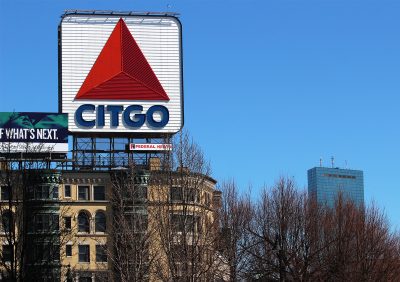
The Citgo sign will remain in Kenmore Square, according to a press release from Boston Mayor Martin Walsh’s office.
Related Beal, the new owner of several Kenmore properties previously owned by Boston University, reached an agreement with Citgo to keep the sign up on Tuesday, according to the release.
Throughout negotiations over the location of the sign, the Boston Preservation Alliance has been submitting petitions to the Boston Landmarks Commission in an effort to preserve the sign as a historic landmark, said Greg Galer, the executive director of the Alliance.
Galer said the deal between Related Beal and Citgo is not a final decision, and the Alliance will continue to fight for landmark status.
“We’re really excited that a deal has been reached between Citgo and Related Beal,” Galer said. “We haven’t seen any of the details of it yet so we look forward to seeing what those are but certainly it’s not a permanent protection.”
Galer said the Alliance has collected more than 16,000 signatures on the petition to name the sign as a historic landmark thus far.
“We think it’s worthy of landmarking,” Galer said. “We shouldn’t have to have this fight again whenever the lease runs up, we don’t know when that’s going to be. We don’t want anyone to have to have this debate again.”
Galer said the Citgo sign is tied to Boston’s identity and has grown to become more significant than its original purpose as an advertisement. Now, the sign is recognized on a national level, according to Galer.
“I’ve been here in Washington on Capitol Hill and talking with staff and members of the congressional delegation and they all feel the same way,” Galer said. “It was interesting to see signs and photographs and images in congressional offices that included Fenway and the Citgo sign.”
The commission formally accepted the organization’s petition last fall, according to Galer, and are now working to create a study report, guidelines and criteria to specify exactly which aspects of the sign are to be protected and what aspect can be considered for future adjustments.
Lauren Zingarelli, the director of communications for the Landmarks Commission, wrote in an email to The Daily Free Press that the study report is currently a working draft and has been unaffected by the deal between Related Beal and Citgo.
“The announcement earlier this week does not impact the Landmark process,” Zingarelli wrote. “That will still proceed as regulated.”
Daniel Bluestone, the director of BU’s Preservation Studies Program, highlighted the iconic nature of the Citgo sign in Kenmore Square, and said it is associated with many other recognizable aspects and traditions of Boston, including the Boston Marathon and Fenway Park.
“When I was going through the interview process to try and take a job at Boston University, I stayed in the Commonwealth Hotel,” Bluestone said. “Right across the street was the Citgo sign and I looked at the sign and I felt like I was home. I think it functions in that way for many people.”
Bluestone said Landmarks Commission previously denied the sign’s landmark status because of modern changes, including the replacement of fluorescent tubes with LED lights. Despite this decision, Bluestone said the sign’s prominence is enough to make it deserving of the title.
“The Landmarks Commission felt that since the sign now has LEDs instead of fluorescent tubes, it’s not the original sign and I think that’s nonsense,” Bluestone said.
Several Boston residents said they were satisfied with the decision to keep the Citgo sign in Kenmore Square, and recognized it as a historic part of the city.
Katelyn Bourgeois, 28, of Brighton, said the sign serves as a symbol of nostalgia to her because of the Red Sox games she attended as a child.
“People … come to the city just come to the Fenway neighborhood to see it,” Bourgeois said. “It’s important and it means a lot to a lot of people around it.”
Jen Mejia, 45, of Roxbury, said the sign does not have any specific significance to her, but it should be preserved because of its historic value.
“I know to the neighborhood and the city and Kenmore square, it’s part of history,” Mejia said.

















































































































